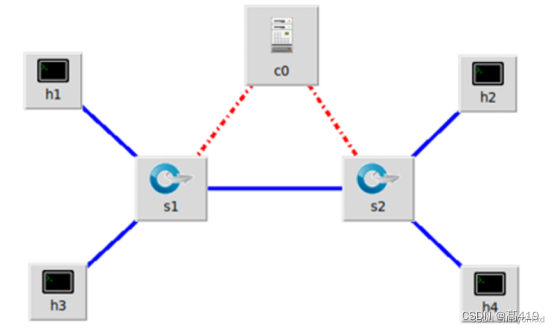
编辑
|
主机 |
IP地址 |
|
h1 |
192.168.0.101/24 |
|
h2 |
192.168.0.102/24 |
|
h3 |
192.168.0.103/24 |
|
h4 |
192.168.0.104/24 |
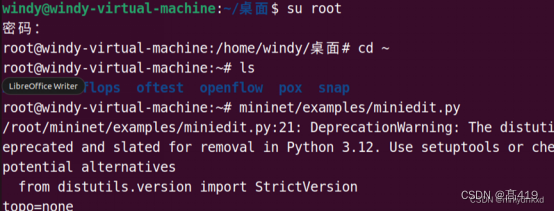
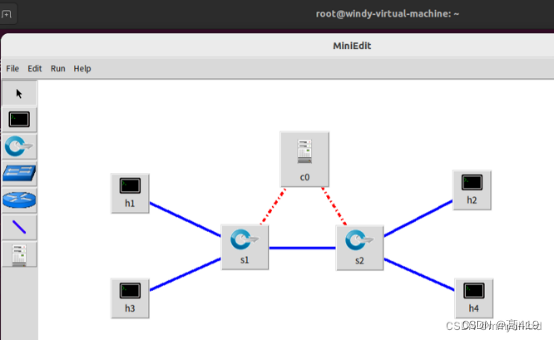
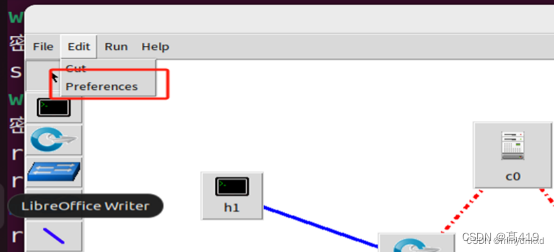
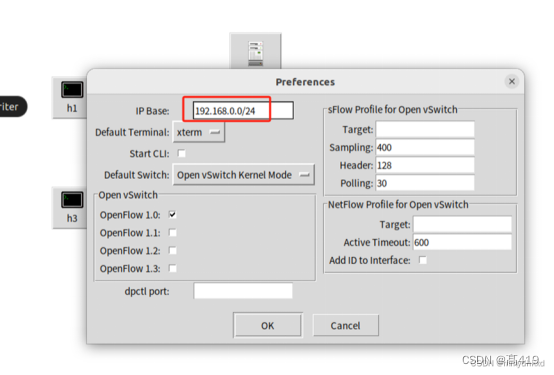
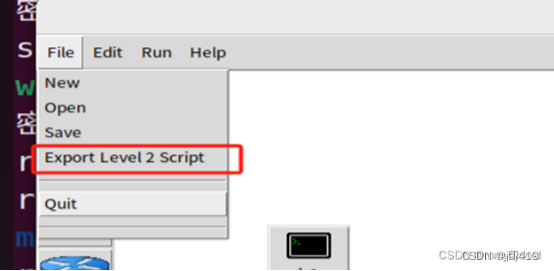
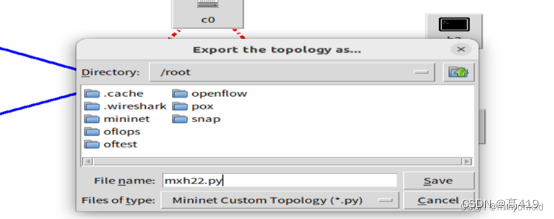


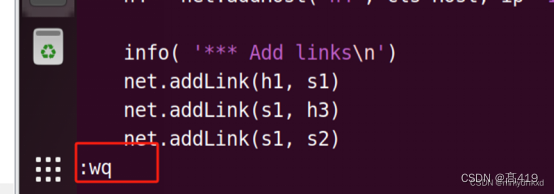

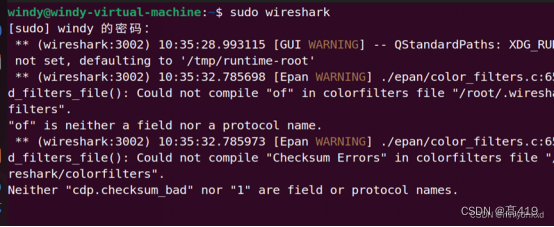
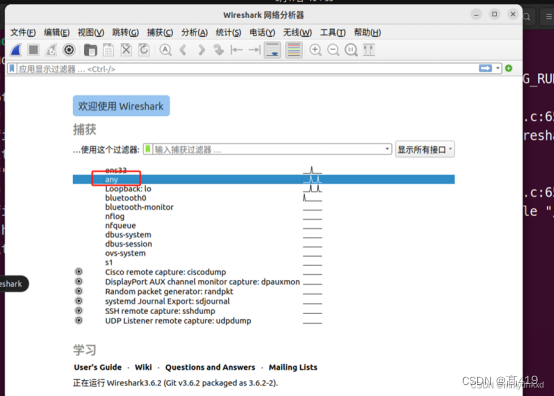
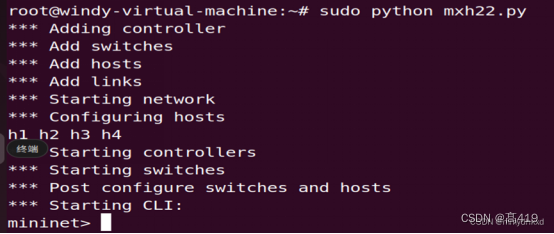

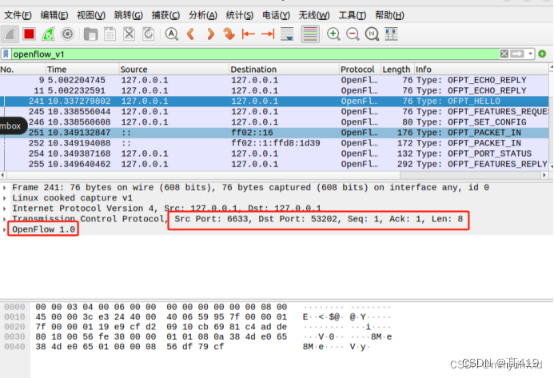
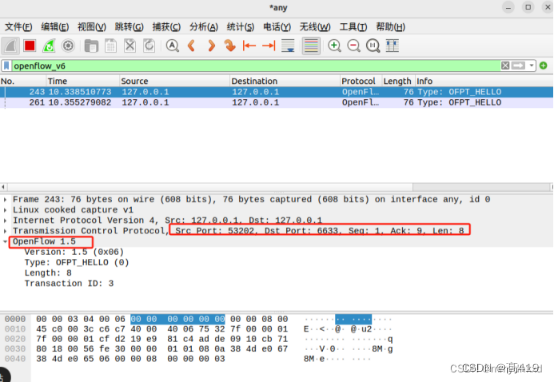
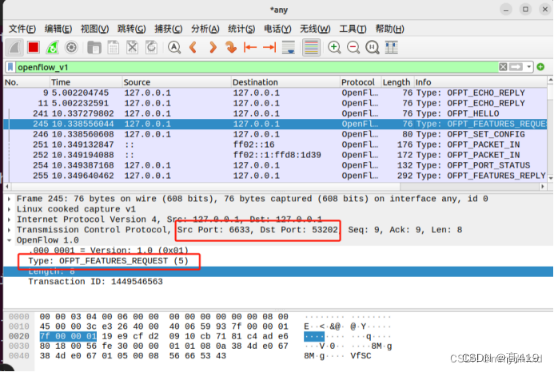
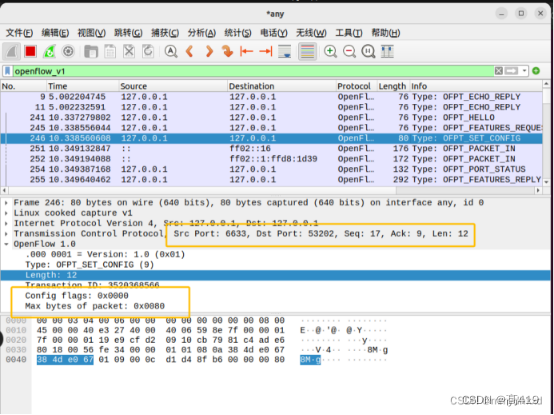
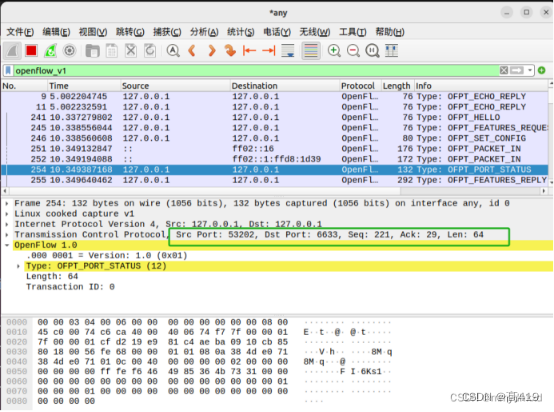
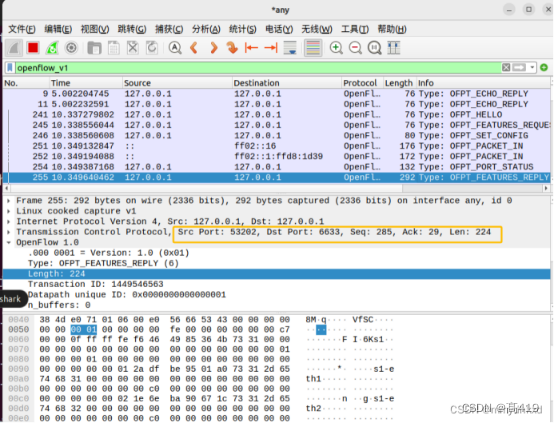
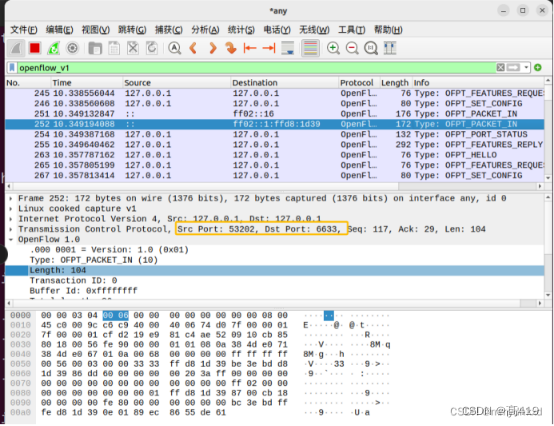
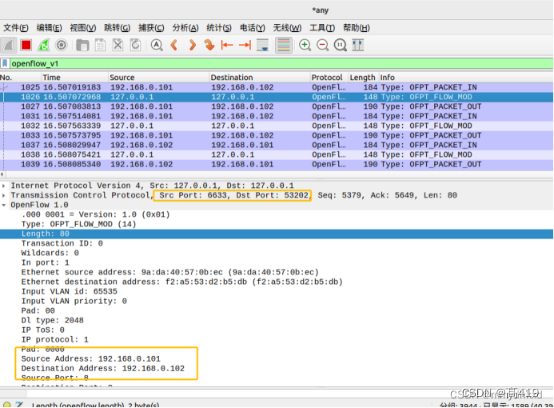
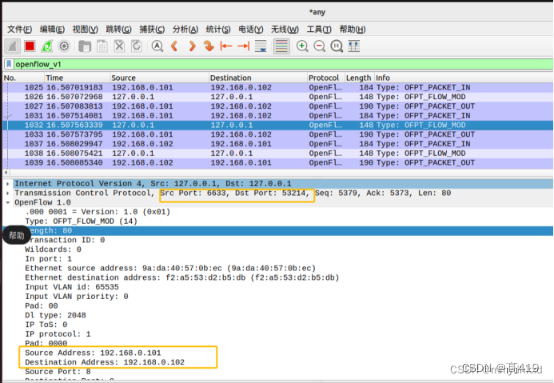
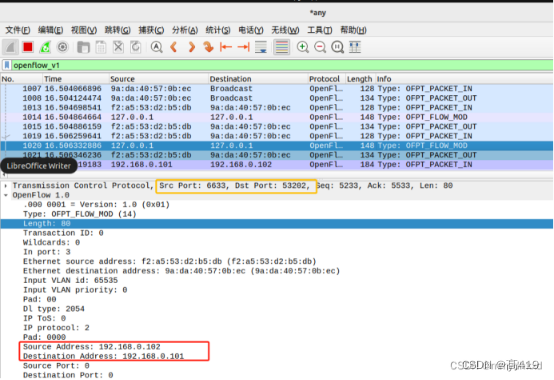
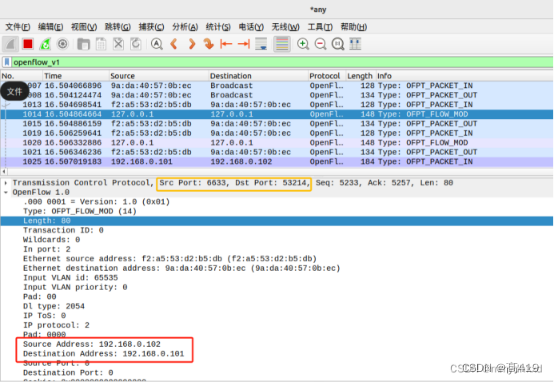
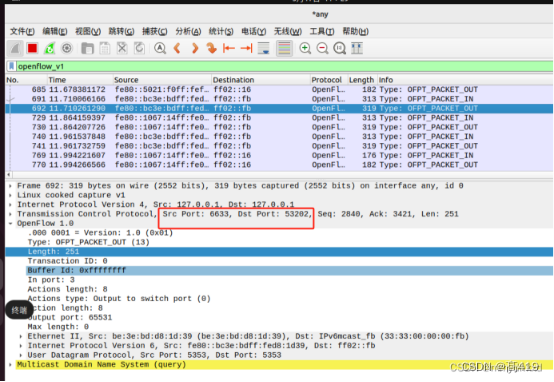
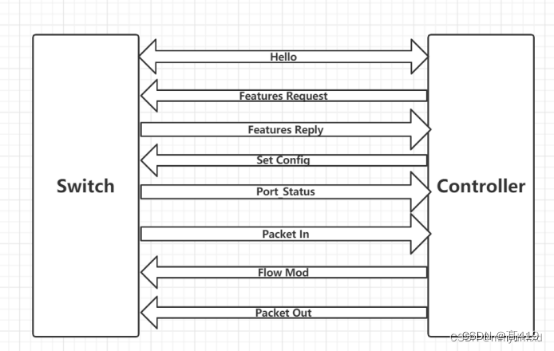
- (二)进阶要求
1.将抓包结果对照OpenFlow源码,了解OpenFlow主要消息类型对应的数据结构定义。
(1)Hello
struct ofp_header {
uint8_t version; /* OFP_VERSION. */
uint8_t type; /* One of the OFPT_ constants. */
uint16_t length; /* Length including this ofp_header. */
uint32_t xid; /* Transaction id associated with this packet.
Replies use the same id as was in the request
to facilitate pairing. */
};/* OFPT_HELLO. This message has an empty body, but implementations must
* ignore any data included in the body, to allow for future extensions. */struct ofp_hello {
struct ofp_header header;
};
- 对应
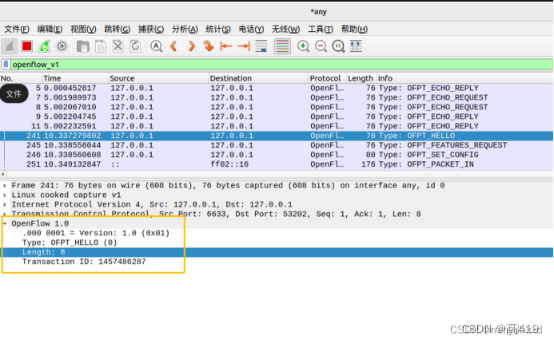 编辑
编辑 - (2)Features Request
- 与Hello中的数据格式相同
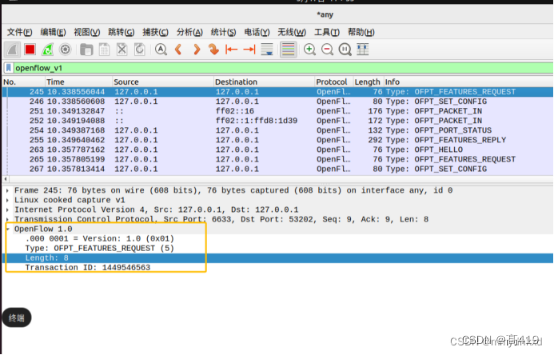 编辑
编辑 - (3)Set Conig
/* Switch configuration. */struct ofp_switch_config {
struct ofp_header header;
uint16_t flags; /* OFPC_* flags. */
uint16_t miss_send_len; /* Max bytes of new flow that datapath should
send to the controller. */
};
- 对应
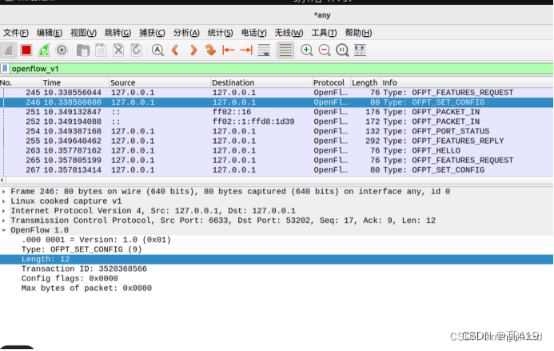 编辑
编辑 - (4)Port_Status
/* A physical port has changed in the datapath */struct ofp_port_status {
struct ofp_header header;
uint8_t reason; /* One of OFPPR_*. */
uint8_t pad[7]; /* Align to 64-bits. */
struct ofp_phy_port desc;
};
- 对应
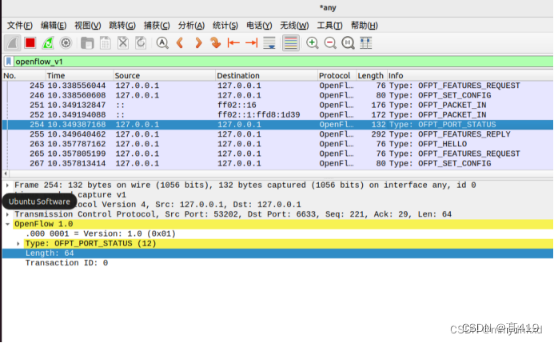 编辑
编辑 - (5)Features Reply
/* Description of a physical port */struct ofp_phy_port {
uint16_t port_no;
uint8_t hw_addr[OFP_ETH_ALEN];
char name[OFP_MAX_PORT_NAME_LEN]; /* Null-terminated */
uint32_t config; /* Bitmap of OFPPC_* flags. */
uint32_t state; /* Bitmap of OFPPS_* flags. */
/* Bitmaps of OFPPF_* that describe features. All bits zeroed if
* unsupported or unavailable. */
uint32_t curr; /* Current features. */
uint32_t advertised; /* Features being advertised by the port. */
uint32_t supported; /* Features supported by the port. */
uint32_t peer; /* Features advertised by peer. */
};/* Switch features. */struct ofp_switch_features {
struct ofp_header header;
uint64_t datapath_id; /* Datapath unique ID. The lower 48-bits are for
a MAC address, while the upper 16-bits are
implementer-defined. */
uint32_t n_buffers; /* Max packets buffered at once. */
uint8_t n_tables; /* Number of tables supported by datapath. */
uint8_t pad[3]; /* Align to 64-bits. */
/* Features. */
uint32_t capabilities; /* Bitmap of support "ofp_capabilities". */
uint32_t actions; /* Bitmap of supported "ofp_action_type"s. */
/* Port info.*/
struct ofp_phy_port ports[0]; /* Port definitions. The number of ports
is inferred from the length field in
the header. */
};
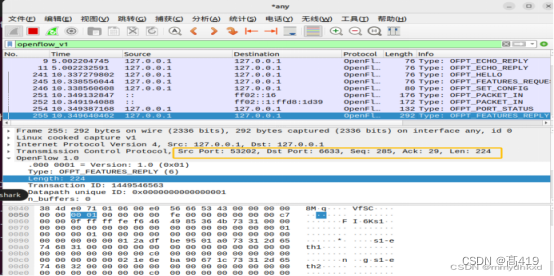
(6)Packet_in
/* Why is this packet being sent to the controller? */enum ofp_packet_in_reason {
OFPR_NO_MATCH, /* No matching flow. */
OFPR_ACTION /* Action explicitly output to controller. */
};
/* Packet received on port (datapath -> controller). */struct ofp_packet_in {
struct ofp_header header;
uint32_t buffer_id; /* ID assigned by datapath. */
uint16_t total_len; /* Full length of frame. */
uint16_t in_port; /* Port on which frame was received. */
uint8_t reason; /* Reason packet is being sent (one of OFPR_*) */
uint8_t pad;
uint8_t data[0]; /* Ethernet frame, halfway through 32-bit word,
so the IP header is 32-bit aligned. The
amount of data is inferred from the length
field in the header. Because of padding,
offsetof(struct ofp_packet_in, data) ==
sizeof(struct ofp_packet_in) - 2. */
};
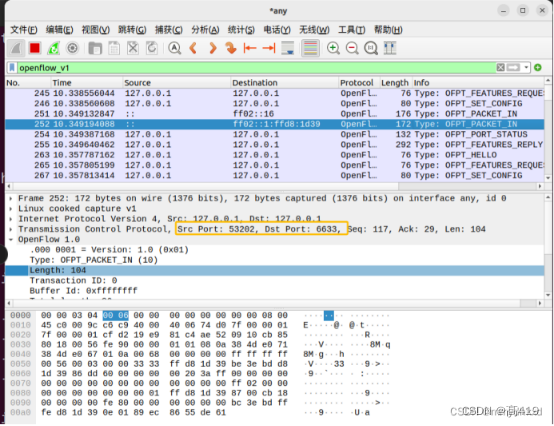
- (7)Flow_mod
/* Fields to match against flows */struct ofp_match {
uint32_t wildcards; /* Wildcard fields. */
uint16_t in_port; /* Input switch port. */
uint8_t dl_src[OFP_ETH_ALEN]; /* Ethernet source address. */
uint8_t dl_dst[OFP_ETH_ALEN]; /* Ethernet destination address. */
uint16_t dl_vlan; /* Input VLAN id. */
uint8_t dl_vlan_pcp; /* Input VLAN priority. */
uint8_t pad1[1]; /* Align to 64-bits */
uint16_t dl_type; /* Ethernet frame type. */
uint8_t nw_tos; /* IP ToS (actually DSCP field, 6 bits). */
uint8_t nw_proto; /* IP protocol or lower 8 bits of
* ARP opcode. */
uint8_t pad2[2]; /* Align to 64-bits */
uint32_t nw_src; /* IP source address. */
uint32_t nw_dst; /* IP destination address. */
uint16_t tp_src; /* TCP/UDP source port. */
uint16_t tp_dst; /* TCP/UDP destination port. */
};/* Flow setup and teardown (controller -> datapath). */struct ofp_flow_mod {
struct ofp_header header;
struct ofp_match match; /* Fields to match */
uint64_t cookie; /* Opaque controller-issued identifier. */
/* Flow actions. */
uint16_t command; /* One of OFPFC_*. */
uint16_t idle_timeout; /* Idle time before discarding (seconds). */
uint16_t hard_timeout; /* Max time before discarding (seconds). */
uint16_t priority; /* Priority level of flow entry. */
uint32_t buffer_id; /* Buffered packet to apply to (or -1).
Not meaningful for OFPFC_DELETE*. */
uint16_t out_port; /* For OFPFC_DELETE* commands, require
matching entries to include this as an
output port. A value of OFPP_NONE
indicates no restriction. */
uint16_t flags; /* One of OFPFF_*. */
struct ofp_action_header actions[0]; /* The action length is inferred
from the length field in the
header. */
};
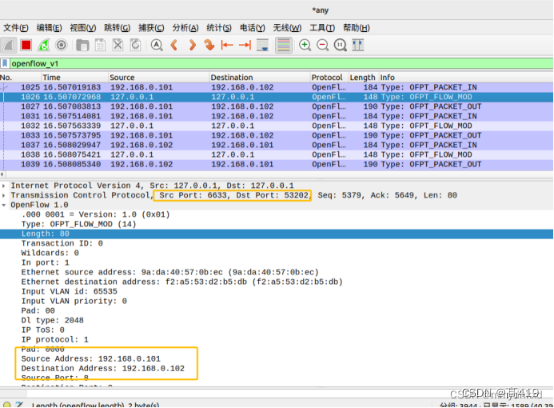
编辑
- (8)Packet_out
/* Action header that is common to all actions. The length includes the
* header and any padding used to make the action 64-bit aligned.
* NB: The length of an action *must* always be a multiple of eight. */struct ofp_action_header {
uint16_t type; /* One of OFPAT_*. */
uint16_t len; /* Length of action, including this
header. This is the length of action,
including any padding to make it
64-bit aligned. */
uint8_t pad[4];
};OFP_ASSERT(sizeof(struct ofp_action_header) == 8);
/* Send packet (controller -> datapath). */struct ofp_packet_out {
struct ofp_header header;
uint32_t buffer_id; /* ID assigned by datapath (-1 if none). */
uint16_t in_port; /* Packet's input port (OFPP_NONE if none). */
uint16_t actions_len; /* Size of action array in bytes. */
struct ofp_action_header actions[0]; /* Actions. */
/* uint8_t data[0]; */ /* Packet data. The length is inferred
from the length field in the header.
(Only meaningful if buffer_id == -1.) */
};
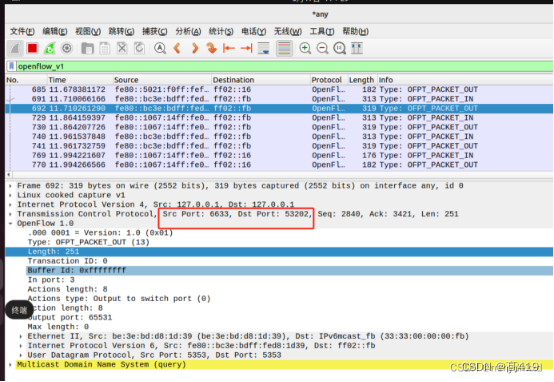
- 四、个人总结
- 实验难度:适中
- 实验过程遇到的困难及解决办法:
- 打开wireshark后创建拓扑,过滤出Openflow数据包,发现一些数据包没有找到,重新看了文件,并上网查阅资料后发现要先打开wireshark再执行Python文件,进行pingall即可找到。
- 个人感想:
本次实验是结课实验,实验难度相对于平常练习会有难度一些,需要建立拓扑后在wireshark中操作,首先要能够熟练使用wireshark,其次就是找包的时候数据很多,容易错过,需要很细心。通过阅读openflow的源码,能理清楚其中的数据结构,并和实际抓到的包的详细信息对应起来,从而理解openflow协议的数据包交互过程。除此之外,对wireshark中过滤器的使用也有了更深刻的了解,对openflow协议有了更深刻的认识,整理实验报告的过程中能够加深对整个交互过程的理解,截图较多,整理起来需要足够的耐心。实验中遇到的问题都得到了解决,对mininet的一些命令行操作也更加的熟练。




















 356
356

 被折叠的 条评论
为什么被折叠?
被折叠的 条评论
为什么被折叠?








